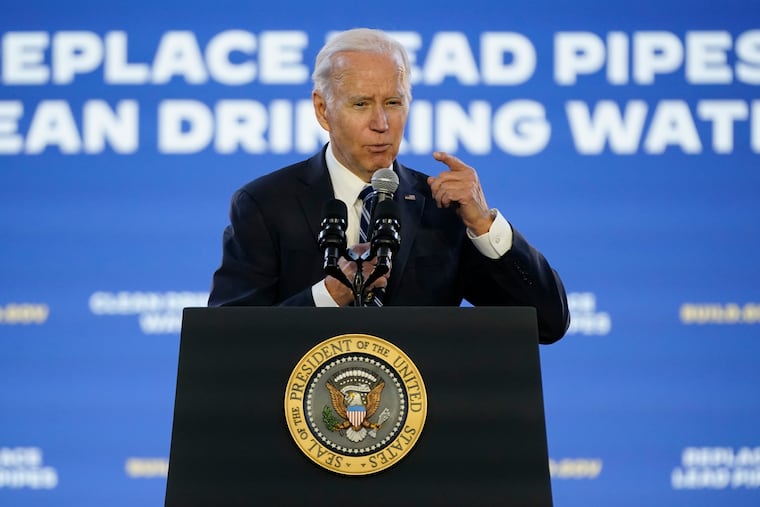What the Biden administration’s proposed rules on replacing lead pipes could mean for Philly
The Philadelphia Water Department in 2017 estimated that 20,000 Philly homes receive water through lead pipes. Proposed EPA rules would force the city to accelerate the pace of replacing them.

President Joe Biden’s administration on Thursday proposed new rules aimed at speeding up the pace of lead pipe replacement to improve public health in cities with aging infrastructure, like Philadelphia.
Lead is a poisonous heavy metal that can leach into water as pipes corrode, and it is especially dangerous for children, for whom lead exposure can cause developmental delays.
» READ MORE: Philadelphia could start using federal funds to replace lead pipes as soon as this spring, city officials said
The Environmental Protection Agency’s proposed rules, which if approved would take effect next year, would require the replacement of all of the nation’s estimated 9 million lead pipes in 10 years.
Here’s what you need to know about the new rules and Philly’s lead pipes:
How many lead pipes does Philly have?
The exact number of lead pipes in Philly is unknown, but the Water Department in 2017 estimated that 20,000 of the city’s 511,000 properties receive water through lead pipes.
One of the new rules the EPA is proposing would require cities to inventory all lead pipes in their jurisdictions, which would result in a more accurate count.
All of Philly’s lead pipes are service lines, which connect households to the city’s water mains under the streets. That makes it more difficult to replace pipes because the city needs homeowners’ permission to locate and replace lines on their properties.
Philly has long used iron instead of lead for its water mains, and the city does not have as big of a lead pipe problem as some of its peers. Chicago, for instance, has hundreds of thousands of lead pipes.
(Lead exposure for Philly kids, however, remains high due to other sources, such as chipping lead paint in older homes and lead that is embedded in the ground after being spewed out from now-defunct industrial plants.)
What is the EPA proposing?
The main provision of the new rule is a requirement that cities eliminate all lead pipes in their jurisdictions over the next decade, at a pace of 10% per year.
That would be a major increase in pace for Philly, which currently replaces 1% to 2% of the city’s lead pipes per year, Water Department spokesperson Brian Rademaekers said.
The proposed rules would also lower the amount of lead permitted in drinking water, from 15 parts per billion to 10 parts per billion.
Environmentalists and child advocates hoped the rules would go further on reducing the allowable lead levels, noting that scientists say there is no safe level of lead in drinking water.
What are people saying about the proposed rules?
Environmentalists cheered the administration’s plan after it was released Thursday.
“Lead pipes that are inherently unsafe and unsuitable for drinking water. The agency’s 10-year deadline turns President Biden’s ambitious public health goal into an enforceable reality,” David Masur, executive director of the PennEnvironment Research & Policy Center, said in a statement. “These toxic pipes are the single largest source of lead-water contamination for millions of Americans.”
Representatives for water utilities, however, fear that the rules may result in an “unfunded mandate” that could be passed on to consumers if the federal government doesn’t do more to help local governments pay for the effort, according to reports.
“These communities would likely have to turn to increased customer water rates,” the Association of Metropolitan Water Agencies wrote in comments to the EPA, according to The Washington Post.
How does Philly replace lead pipes now?
The Water Department’s primary strategy for pipe replacement is to reach out to homeowners on blocks where city workers are already working on water main replacements.
In those instances, the city pays for the cost of all lead pipe replacements on the block at no cost to the property owners and lumps it into the cost of the water main project.
For a property owner who requests a pipe replacements when no work is taking place on their block, the city offers a zero-interest loan program and connects them with potential contractors.
Will rates go up in Philly?
Without additional federal funding, the new rules may cause already-increasing water rates to go up even further in Philly, Rademaekers said.
» READ MORE: Water bills in Philly might rise soon, as department requests rate increase
“Based on current funding levels, there does not seem to be enough federal funding available to support the replacement of lead services across the country,” Rademaekers said. “It appears that either additional federal funding will be needed and/or water utilities will need to leverage water rates to fund the pace of replacement outlined in the rule.”
Earlier this year, Biden pledged $500 million in federal assistance for pipe replacement in Philadelphia, and the city is pursuing other grant and loan opportunities to accelerate its pace. But Rademaekers said that still may not be enough to meet the demands of the new regulations.
“It’s likely that an accelerated service line replacement program will impact rates, but it is too early to understand the rate impacts at this time,” he said.